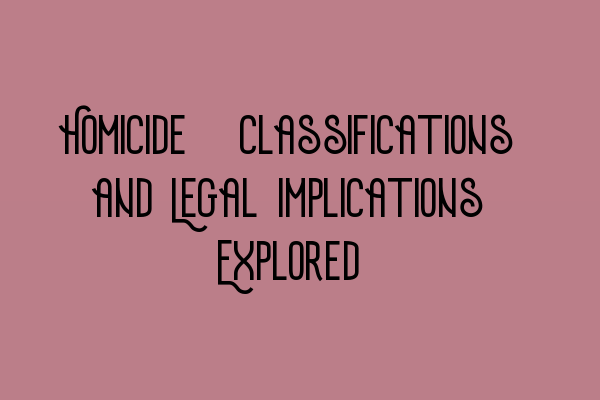Homicide: Classifications and Legal Implications Explored
When a life is tragically taken, the legal repercussions are severe and complex. Homicide refers to the act of unlawfully causing someone’s death, and it is one of the most serious crimes under the criminal law in the UK. In this article, we will delve into the various classifications of homicide and explore the legal implications associated with them.
1. Murder
Murder is perhaps the most widely recognized form of homicide. It occurs when one person intentionally causes the death of another with malice aforethought. Malice aforethought refers to the intent to cause serious harm or death, demonstrating a high level of culpability.
The legal elements of murder require the prosecution to prove that the accused had the necessary intent, and that the act was premeditated and deliberate. Murder convictions often result in lengthy prison sentences, and sometimes even life imprisonment.
2. Manslaughter
Manslaughter is a broader category that encompasses unlawful killings that lack the element of malice aforethought. Unlike murder, manslaughter involves either a lack of intent, or the presence of mitigating circumstances that reduce the defendant’s culpability.
There are two main forms of manslaughter:
- Voluntary Manslaughter: This occurs when the accused causes the death intentionally but is able to argue extenuating circumstances, such as provocation or diminished responsibility. Sentences for voluntary manslaughter are typically shorter than those for murder.
- Involuntary Manslaughter: This type of manslaughter refers to deaths caused by recklessness or criminal negligence, without the intention to cause harm. It is often associated with accidental killings or deaths that occur during the commission of another unlawful act.
Both forms of manslaughter carry serious penalties, with the severity depending on the specific circumstances of the case.
SQE 1 Practice Mocks FLK1 FLK2
3. Infanticide
Infanticide is a unique form of homicide that applies specifically to the killing of a child under the age of one by their mother. This offense recognizes the postpartum mental suffering experienced by some women and offers a degree of leniency. If the accused can prove that her mind was disturbed due to the effects of childbirth, the charge may be reduced to infanticide.
Infanticide convictions result in less severe penalties than murder or manslaughter, aiming to provide support and rehabilitation to the mother rather than imposing excessive punishment.
4. Corporate Homicide
Corporate homicide, also known as corporate manslaughter, focuses on the criminal liability of corporations and organizations for deaths that occur due to their negligent practices or failures. Such cases arise when a breach of duty by the organization directly causes the death of an individual.
Corporate manslaughter can lead to substantial fines and court orders for companies, as well as potential damage to their reputation. The law holds organizations accountable for their actions and emphasizes the importance of maintaining proper health and safety protocols.
5. Attempted Homicide
Although homicide refers to the actual act of causing death, it is essential to consider attempts to commit homicide. Attempted homicide occurs when an individual takes substantial steps towards causing the death of another person, but is unsuccessful in their endeavor.
The law treats attempted homicide as a serious offense, recognizing the dangers involved and the potential harm that could have occurred if the attempt had been successful. The penalties for attempted homicide are significant, aiming to deter individuals from engaging in such dangerous acts.
Conclusion
Homicide encompasses a range of offenses, each with its own distinctive legal implications. Understanding the classifications of homicide is crucial for legal professionals navigating the complexities of criminal law. Whether it is murder, manslaughter, infanticide, corporate homicide, or attempted homicide, each offense requires a thorough examination of the evidence and legal principles.
The legal consequences of homicide can have a profound impact on the lives of both the victims and the accused. It is essential to engage experienced criminal law solicitors who can provide expert guidance and representation throughout the legal process.
For further information on criminal law and practice, please explore our SRA SQE Exam Dates and consider enrolling in our comprehensive SQE Preparation Courses. Knowledge and preparation are key to success in understanding and navigating the intricacies of criminal law.
